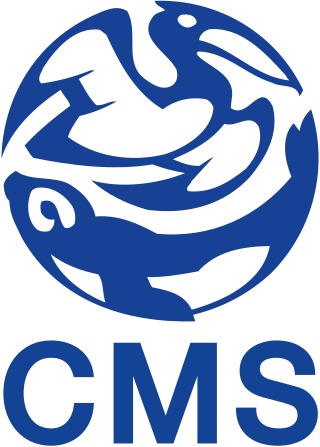
The Convention on Biological Diversity (CBD), known informally as the Biodiversity Convention, is a multilateral treaty. The Convention has three main goals: the conservation of biological diversity ; the sustainable use of its components; and the fair and equitable sharing of benefits arising from genetic resources. Its objective is to develop national strategies for the conservation and sustainable use of biological diversity, and it is often seen as the key document regarding sustainable development.

The United Nations University (UNU) is the think tank and academic arm of the United Nations. Headquartered in Shibuya, Tokyo, Japan, with diplomatic status as a UN institution, its mission is to help resolve global issues related to human development and welfare through collaborative research and education.
The United Nations Convention to Combat Desertification in Those Countries Experiencing Serious Drought and/or Desertification, Particularly in Africa (UNCCD) is a Convention to combat desertification and mitigate the effects of drought through national action programs that incorporate long-term strategies supported by international cooperation and partnership arrangements.

The United Nations Environment Programme (UNEP) is responsible for coordinating responses to environmental issues within the United Nations system. It was established by Maurice Strong, its first director, after the United Nations Conference on the Human Environment in Stockholm in June 1972. Its mandate is to provide leadership, deliver science and develop solutions on a wide range of issues, including climate change, the management of marine and terrestrial ecosystems, and green economic development. The organization also develops international environmental agreements; publishes and promotes environmental science and helps national governments achieve environmental targets.

The International Union for Conservation of Nature (IUCN) is an international organization working in the field of nature conservation and sustainable use of natural resources. It is involved in data gathering and analysis, research, field projects, advocacy, and education. IUCN's mission is to "influence, encourage and assist societies throughout the world to conserve nature and to ensure that any use of natural resources is equitable and ecologically sustainable".

The Global Environment Facility (GEF) is a multilateral environmental fund that provides grants and blended finance for projects related to biodiversity, climate change, international waters, land degradation, persistent organic pollutants (POPs), mercury, sustainable forest management, food security, and sustainable cities in developing countries. It is the largest source of multilateral funding for biodiversity globally, and distributes more than $1 billion a year on average to address inter-related environmental challenges.

The United Nations Institute for Training and Research (UNITAR) is a dedicated training arm of the United Nations system. UNITAR provides training and capacity development activities to assist mainly developing countries with special attention to Least Developed Countries (LDCs), Small Island Developing States (SIDS) and other groups and communities who are most vulnerable, including those in conflict situations.

ICLEI – Local Governments for Sustainability is an international non-governmental organization that promotes sustainable development. ICLEI provides technical consulting to local governments to meet sustainability objectives.

The Convention on the Conservation of Migratory Species of Wild Animals, also known as the Convention on Migratory Species (CMS) or the Bonn Convention, is an international agreement that aims to conserve migratory species throughout their ranges. The agreement was signed under the auspices of the United Nations Environment Programme and is concerned with conservation of wildlife and habitats on a global scale.

The Agreement on the Conservation of Populations of European Bats, or EUROBATS, is an international treaty that binds its States Parties on the conservation of bats in their territories. It was signed in 1991 under the auspices of the Convention on the Conservation of Migratory Species of Wild Animals (CMS), with the Agreement entering into force in 1994. In August 2021, the Agreement applied to 38 of 63 range states.

Karen Christiana Figueres Olsen is a Costa Rican diplomat who has led national, international and multilateral policy negotiations. She was appointed Executive Secretary of the UN Framework Convention on Climate Change (UNFCCC) in July 2010, six months after the failed COP15 in Copenhagen. During the next six years she worked to rebuild the global climate change negotiating process, leading to the 2015 Paris Agreement, widely recognized as a historic achievement.

The Memorandum of Understanding on the Conservation of Migratory Sharks is an international instrument for the conservation of migratory species of sharks. It was founded under the auspices of the Convention on the Conservation of Migratory Species of Wild Animals.

The International Institute for Sustainable Development (IISD) is an independent think tank founded in 1990 working to shape and inform international policy on sustainable development governance. The institute has three offices in Canada - Winnipeg, Ottawa, and Toronto, and one office in Geneva, Switzerland. It has over 150 staff and associates working in over 30 countries.

The United Nations Office for Disaster Risk Reduction (UNDRR) was created in December 1999 to ensure the implementation of the International Strategy for Disaster Reduction.
Global Environmental Governance is the title of a book written by Adil Najam, Mihaela Papa and Nadaa Taiyab. All the information of this article comes from this book.

Langer Eugen is an office tower in the Gronau district of Bonn, Germany. It was built between 1966 and 1969. Since 2006 it has housed several United Nations organizations. Until the German Bundestag (parliament) moved to Berlin in 1999, the building was the primary location for the offices of the members of the Bundestag. After renovations, eleven UN organizations moved into the building and it began serving as the center of the UN Campus, Bonn. Langer Eugen is protected as a landmark or listed building under the North Rhine-Westphalia Monument Protection Law. It is currently the second-tallest building in Bonn and the 43rd tallest building in Germany. When it was built it was briefly the second-tallest building in Germany, behind the Bayer-Hochhaus.
Ecosystem-based adaptation (EbA) encompasses a broad set of approaches to adapt to climate change. They all involve the management of ecosystems and their services to reduce the vulnerability of human communities to the impacts of climate change. The Convention on Biological Diversity defines EbA as "the use of biodiversity and ecosystem services as part of an overall adaptation strategy to help people to adapt to the adverse effects of climate change".

Elizabeth Maruma Mrema is a Tanzanian biodiversity leader and lawyer, living in Montreal, Canada, who has been serving as Deputy Executive Director of the United Nations Environment Programme (UNEP) since 2023, under the leadership of Executive Director Inger Andersen.


















